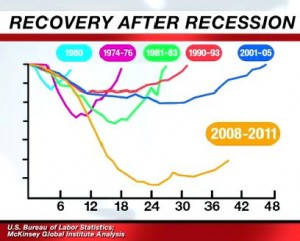
Have we forgotten whose policies caused the plunge?
In the graphic above, lifted from ABC’s “This Week” with Christiane Amanpour, the yellow line shows how much deeper the current recession is than all previous recessions, at least since 1980. So because the economy is not healing fast enough, we should turn its management back to the people whose policies caused the crash in the first place? Look doctor, my loved one isn’t getting better as fast as I would like. So I think I’m going to go back to the doctor who administered the poison. You know, because whatever you’re trying to do isn’t working. Maybe that other doctor will be good this time.
This reasoning seems to be treated as perfectly logical in the lame stream media. That’s right, I’m using Sarah Palin’s phrase, but for the complete opposite reason. The lame stream media seems to accept the Republican spin that reducing the deficit is the most important step we can take to create jobs. Why? It’s clearly bullshit. Yes we need to cut the deficit, but to even pretend that this will somehow revive the economy is ludicrous. Cutting is cutting. You can’t cut programs without cutting jobs.
What does a CEO do when he needs to get the company back on solid footing? He cuts jobs. He lays people off. He reduces spending to improve the bottom line and get profits back up. Fine. This restoration of the company’s fiscal health doesn’t create jobs, it costs jobs.
The policies the Republicans are trying to put through are not about jobs. They are about deficit reduction, which is essentially restoring the country to a fiscal balance. They seem to view government as a big corporation that is not in good fiscal health and themselves as CEOs who will cut spending and restore the company to the black. They clearly care more about fiscal responsibility, i.e. profits, than they do about the well-being people. This is about the ideology, or rather mythology, of personal freedom. When people are free from government regulations and programs that take money from the worthy workers and wealthy job-creators and give it to the undeserving lazy poor then everything will be in balance and a growing economy will be magically restored.
Not only is this ideology totally wrong, with no possible way of creating growth, it will exacerbate the destabilizing disparity of more money going to fewer and fewer super rich overlords. This is fascism and it’s where Republican policies have been and will continue taking us.
At this moment in time, as the Republicans petulantly refuse to consider any discussion of closing loopholes on their large corporate puppet masters, it seems as if many of these zealots truly believe in the righteousness of their cause and are willing to crash the global economy in the name of fiscal balance. This is shear madness. And yet the “free press” pretends that it’s a legitimate approach. How can one not be pessimistic when clear stupidity passes for a valid economic option and when people are so deluded and mislead that they will seriously consider returning the patient to the care of the poisoner?
